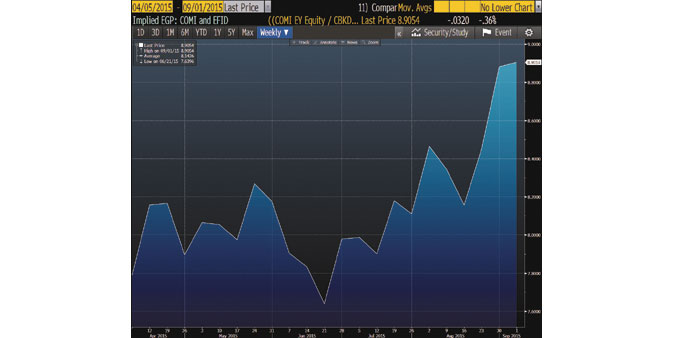Bloomberg/Cairo
Traders are convinced Egypt won’t resist the pressure to weaken the pound for long.
The black market for dollars on Cairo’s streets has re-emerged for the first time since April, signalling investors and businesses are betting the pound’s official rate of 7.83 per dollar no longer represents its true value. Forward contracts imply a 20% weakening in 12 months and the country’s foreign-listed shares trade at a 14% discount to local prices.
If the signs are right, Egypt may follow nations such as Kazakhstan and Vietnam that were forced to depreciate their currencies after China’s shock yuan devaluation on August 11. The North African nation, which weakened its currency peg twice in 2015, can’t afford the loss of export competitiveness as it seeks to boost foreign-exchange holdings that have barely recovered from a plunge that wiped out more than half of them following the so-called Arab Spring protests four years ago.
“China’s devaluation is pushing all emerging markets to do the same to stay competitive, leaving Egypt with no choice but to follow suit,” said Omar El-Shenety, the managing director of Cairo-based investment bank Multiples Group. “Investors see this, as well as the increased monetisation of government debt and slow recovery of foreign direct investment and tourism, as reasons for the pound to weaken.”
Egypt’s central bank has kept the pound’s dollar peg steady for three months as it fights to curb inflation in a country where almost half of the population lives below or near the poverty line. The strategy risks exacerbating an already widening trade deficit - Egypt imports almost triple what it exports - and turning away foreign investment.
Since the yuan devaluation, emerging-market currencies have tumbled. Brazil’s real, Russia’s rouble and Colombia’s peso have each lost at least 6%. That has added to the depreciation pressure on controlled currencies such as the Egyptian pound.
One-year pound forwards traded at 9.8 a dollar yesterday. They reached 10.125 on August 24, the lowest prediction since Bloomberg started tracking the data in 2007. On average, the overseas listings of Egypt’s three most liquid stocks were trading at an implied value of 9.054 pounds a dollar at 12.20pm in Cairo, compared with 7.81 at the end of June.
Cairo’s streets witnessed the dollar trading outside banks at 8.033 pounds, a 2.5% discount to the pound’s official value of 7.83. That’s the first time since April the unofficial price has broken outside the central bank’s approved range.
Foreign investors have dumped nearly all of the $10bn of local government debt held before the 2011 Arab Spring. President Abdel Fattah al-Sisi’s policy changes - such as cutting fuel subsidies – and billions of dollars from Gulf allies have boosted economic growth, though it’s still falling short of pre-revolution levels.
The central bank has devalued the pound twice this year, most recently in July. The currency is down 8.7% in 2015, the most in the Middle East behind Algeria’s dinar and Iran’s rial.
The pound “remains massively overvalued,” said Anthony Simond, a London-based investment analyst who helps manage $13bn of emerging-market debt at Aberdeen Asset Management. “The reason we and many others haven’t come back to the local market is because we expect some kind of depreciation in the future. Decision-making is very opaque, which makes the risk-reward picture unappealing for us.”
Central bank officials weren’t available to comment when contacted by Bloomberg.

